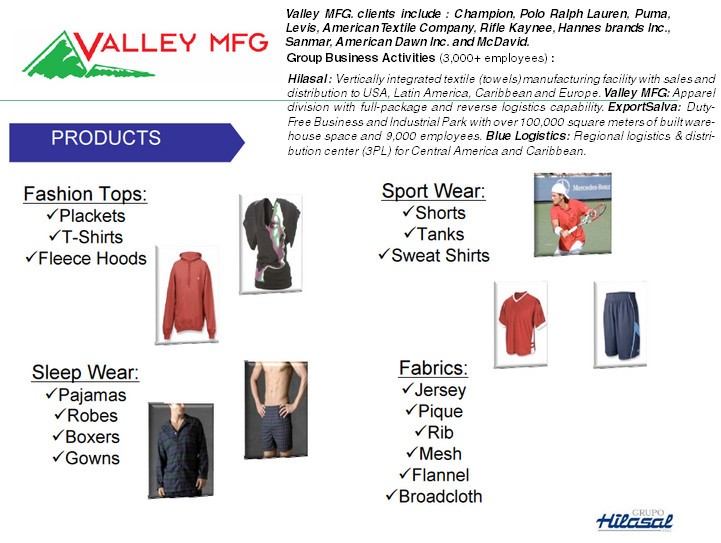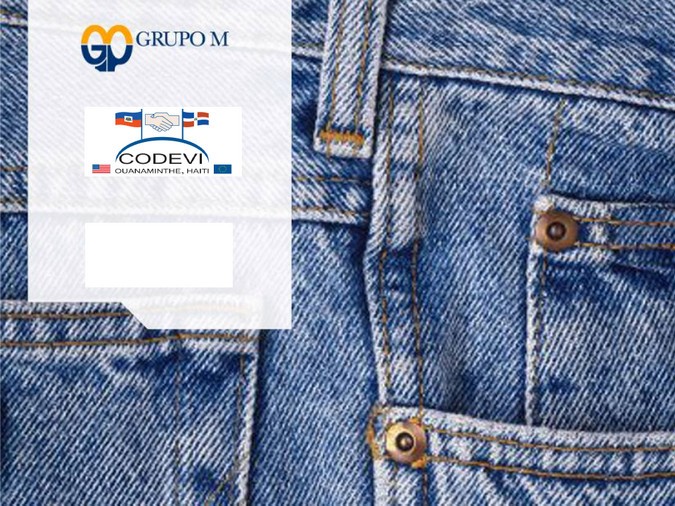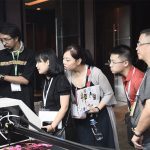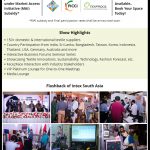Walter Wilhelm and Barbara Zeins
Walter Wilhelm from Walter Wilhelm Associates and Barbara Zeins from Gerson & Gerson analyse the advantages and challenges of sourcing from countries in the Western world compared to Asia.
Items to Consider when Sourcing in a New Region
- Why Move? – Remember new relationships inherently have more unknowns and more risk than existing relationships
- What Benefits? – Normally companies are looking for cost savings but speed-to-market and flexibility may be equally important incentives
- Profile Potential Contractors – Do they match your requirements in terms of products and quantities; where do you find the information?
- Consider Communication and Audits – Language/Travel
- Is Social/Environmental Compliance a Factor?
- Cultural Differences may be important.
Historic Factors Influencing US Sourcing
In the past, “Bigness” was synonymous with “Goodness”.
Pro-Asia
- Lowest cost
- Full Package
- Large quantities
Pro-Western Hemisphere
- Geographic proximity
- CMT Production
- Trade Preferences (NAFTA/CAFTA)
Today’s Factors Influencing US Sourcing
Today, “Nimbleness” is synonymous with “Goodness”
Pro-Asia
- Low cost (but higher % increase)
- Full Package (but less of a differentiator)
- Clustering
- Large quantities
Pro-Western Hemisphere
- Speed-to-Market, Replenishment
- Smaller quantity capability
- Full Package and/or CMT Production
- Trade Preferences (NAFTA/CAFTA)
- Recently – costs increasing faster in Asia; capacity concerns because of internal consumption demands
Examining Factors Influencing Sourcing
Labor Rates (US$) – Estimated minimum hourly including taxes & fringes in different countries are :
- United States : $8.70
- Germany : $14.50- $19.00+
- China : $0.52 – $1.10
- India : $0.39
- Bangladesh : $0.19
- El Salvador, Guatemala, Honduras : $0.75
- Nicaragua : $0.41
- Dominican Rep. : $0.62
- Haiti : $0.39
- Mexico : $0.55
Other Factors Influencing Sourcing
Availability of Raw Materials and Components
Asia :
- China has clustered most raw materials and components so available and very efficient
- Other Asian countries are not as efficient but OK.
Western Hemisphere :
- US Suppliers – Many mills have closed; other suppliers have difficulty competing globally.
- CAFTA-DR – Limited fabric (especially woven) available but trims and components normally exist.
- Mexico – Has decent resources but other infrastructure problems.
Shipping Time Comparison
(including estimated costs to Germany, 40 Foot Container)
From/To Surface Cost
Estimate
China (Guangzhou)/Bremen; Sea 30 Days $2,985
China (Guangzhou)/Bremen; Rail 18 Days More Expensive
DR/Hamburg 14 Days $2,800
- Includes estimated time Factory to Port
- Does not include Customs Clearance or in-country shipping to Distribution Center or Retail Store
- Sea shipping can be accelerated (slightly) but at higher cost and larger carbon footprint
Communication, Partnerships, Technology
Communication :
- Product Communication – Veracity of status sometimes questionable
- Travel Differences – consider risk, time, difficulty of travel
- Cultural Differences – In general, Western Hemisphere will be better aligned with Europe
If you are going to source in CAFTA-DR :
- Join the AAPN, the only industry association that dedicates efforts to the region. Membership is not expensive, the meetings are awesome
- Start by finding a service that understands the region and will help you “get started”
Embrace Technology to Facilitate Communications :
- PLM, Supply Chain Management
A Few examples of Exceptional Factories
- Denimatrix – Vertical jeans operation; Guatemala
- Valley/Hilasal – Woven & Knit Apparel, Vertical Towel; El Salvador
- Rocedes – Nicaragua
- TexOps – Performance knitwear; El Salvador
- Grupo M/CODEVI – Woven & Knit Apparel, Dom Republic/Haiti
Closing Comments
- Some Europeans have expressed concern that contractors in Central America are unreliable. Is this justified?
- The “good” factories are world class and reliable. The “trick” is in finding which ones are good/reliable and locking in some capacity guarantees.
- Is there a different “mentality” between manufacturers in Central America and Asia? What are the major differences?
- US companies were the drivers in developing Latin America. They forced the companies to operate as “Maquilla” (assembly) operations and later as CMT; until 2005 there was almost no full-package from Central America.
- Central American companies are normally privately owned with little or no government support. Asian companies (especially China) often receive support from support and incentives from government.
- US companies also had a major influence in Asia but it wasn’t practical to have Asia as an assembly only operation; full package almost from the start
- Skills are comparable; work ethic in Asia is A+
Closing Comments
Follow similar guidelines to doing business as in any region of the world.
- Work with a partner that knows the region (AAPN is a good place to start)
- Use the M&S approach of “partnering” with your vendor; develop long-term relationships
- Don’t be an absentee manager; visit your partners
- Communicate, Communicate, Communicate (help develop the protocols, if necessary)
About the Authors
Barbara Zeins :
- President of major girls dress company for many Years
- Has personally sourced products in Asia, Central America and South America
- Participated in study of Dominican Republic apparel industry
- Frequent speaker at industry events involving regional sourcing
Walter Wilhelm :
- Chairman/CEO of Walter Wilhelm Associates LLC
- Has opened and been responsible for offices in Hong Kong, Taipei, Jakarta, Europe (UK, Germany, Italy, Sweden)
- Has worked extensive in the CAFTA-DR region plus Haiti and Mexico for 10 year including major studies in El Salvador, the DR, Haiti and Mexico (for UNIDO) (for UNIDO)
Contact details :
Walter Wilhelm
Walter Wilhelm Associates LLC
2744 E. Eagle Way
Salt Lake City, UT 84108 USA
801.582-1967
wwilhelm@walterwilhelmassoc.com
Barbara Zeins
Gerson and Gerson Inc.
100 W. 33rd Street, Suite 911
New York, NY 10001 USA
212.244-6775, ext. 222
barbara.zeins@gersonandgerson.com
Profile of Valley Manufacturing
Social Responsibility : Group’s Labor and Social Welfare Policies are fully compliant with national labor laws and regulations. More importantly, they are based on mutual respect and dignity for the individual.
Wages – The vast majority of our employees are paid well in excess of the legally mandated minimum wage.
Working Hours & Working Conditions – 44 hour workweek, allowing for voluntary overtime work with compensation according to law. There are strict industrial and employee safety programs in place in order to guarantee a safe, clean and labor-harmonious working environment.
Benefits – Workers are entitled to : Subsidized health care; Pediatric clinic for the children of employees; Annual health and vaccination fairs; Paid maternity leave; Two-week paid vacation; Retirement plan; Christmas bonus; Personal loans at preferential interest rates; Student loans and scholarships; World class educational facility with a 3-year curriculum in english and computer literacy for employees and their families; Employee transportation.
Child Labor – No one under the age of 18 is employed. Extensive safeguards are in place to ensure total compliance with this policy.
Equal Opportunity – No discrimination based on gender, race, religion or ethnic origin.
Right of Association – Employees have the right of free, peaceful and lawful association.nviaroment
Enviromental Policies : Hilasal plays a leadership role in promoting environmentally conscious practices and programs.
- State of the art water treatment and conservation facilities and environmentally friendly boiler
- Provide water treatment expertise and laboratory services to other companies in El Salvador
- Work with environmentally conscious suppliers
- Use biodegradable dyes
- Promote annual national reforestation programs
Contact details :
Export Salva Free Zone
Km. 24 Carretera a Santa Ana – Colon, La Libertad, El Salvador, C.A.
Tel. +503 2319-2230 Fax +503 2319-2285 Email : vm@valley.com.sv
(Contact person : Katya Delgado-Vásquez)
Profile of Textiles Opico SA de CV
A vertically integrated private label apparel OEM (original equipment manufacturer) providing complete services :
- Raw material development.
- Apparel product development.
- Logistics and distribution.
- LEAN enterprise and manufacturing process.
- Leadership in environmental and social programs.
TexOps’ customers are amongst the finest active and performance wear brands and retailers. TexOps is a “Multi-Style” factory producing a wide variety of active and performance knitwear. Production cells are cross trained ir at least 2-3 different sew types per operator. Cells flexible to produce both tops and bottoms. Factory averages 19 style changes per week.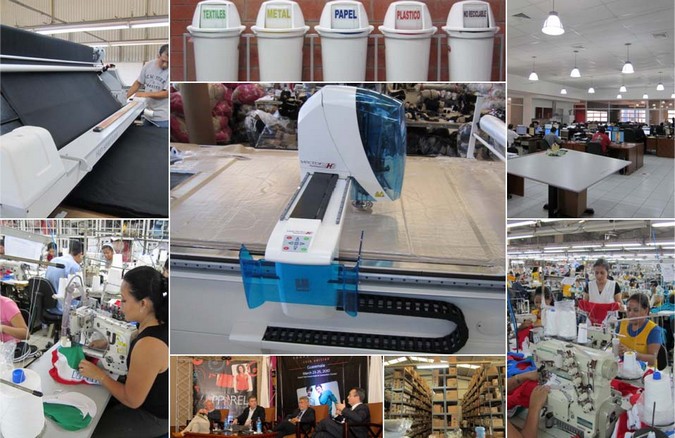
3D Prototyping : Fit approvals can be accomplished in days instead of weeks. Reduces product development cycle by 60 days. Savings on courier charges back and forth, reduced carbon footprint.
Contact details :
Textiles Opico SA de CV
KM 31.4 Carretera a Santa Ana
San Juan Opico, La Libertad, El Salvador
T: +503.2319.0800 Email : info@TexOps co
CODEVI was founded in 2003. Currently it supplies 6.8 million pants, 2.9 million Dozen shirts and 2.4 million ladies intimates each year to U.S. leading brands – from concept to retail. CODEVI is a division of Grupo M, a Vertical Textile Corporation in the Dominican Republic founded in 1986
